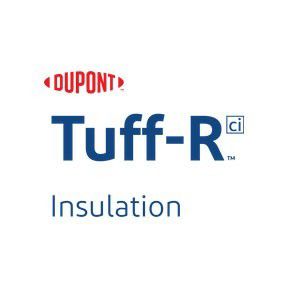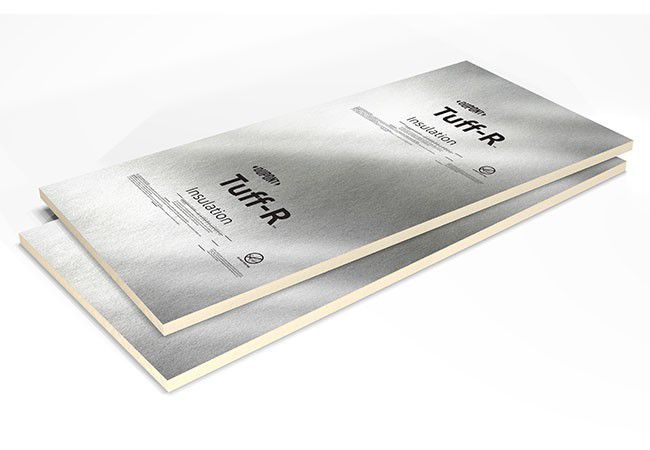DuPont™ Tuff-R™ Polyisocyanurate Insulation
High-Performance Polyiso Foam with Dual Reflective Foil Facers


DuPont™ Tuff-R™ Polyisocyanurate Insulation
High-Performance Polyiso Foam with Dual Reflective Foil Facers
Features & Benefits
Specifications
Standard Sizes
| Thickness | Width | Length | R-Value | Edge Treatment |
|---|---|---|---|---|
| 1/2 in. | 4 ft. | 8 ft. | 3.5 | Square Edge |
| 3/4 in. | 4 ft. | 8 ft. | 5.1 | Square Edge |
| 1.0 in. | 4 ft. | 8 ft. | 6.8 | Square Edge |
| 1 1/2 in. | 4 ft. | 8 ft. | 10.2 | Square Edge |
| 2.0 in. | 4 ft. | 8 ft. | 13.5 | Square Edge |
Note: Please be advised that additional sizes may be available. Availability of all sizes varies by region and is subject to change. For further information, please contact your local DuPont Sales Representative or call us at 1-866-338-7668.
Testing
<b>Tuff-R™ Insulation</b> exhibits the properties and characteristics indicated in the table below when tested as represented. Review all instructions and (Material) Safety Data Sheet ((M)SDS) before use. Please contact DuPont at 1-833-338-7668 when additional guidance is required for writing specifications that include this product.
| TEST METHOD | TEST TITLE | PROPERTY | RESULTS |
|---|---|---|---|
| FIRE | |||
| ASTM E84 | Standard Test Method for Surface Burning Characteristics of Building Materials | Surface Burning Characteristics1 | Flame Spread ≤ 75 Smoke Developed ≤ 450 Core and Finished Product |
| THERMAL | |||
| ASTM C518 | Standard Test Method for Steady-State Thermal Transmission Properties by Means of the Heat Flow Meter Apparatus | Thermal Resistance 1 inch @ 75°F mean temp2 | 6.8 ft2 •h•°F/Btu, R-value, min. |
| ASTM D2126 | Standard Test Method for Response of Rigid Cellular Plastics to Thermal and Humid Aging | Dimensional Stability | 0.8% linear (length & width) |
| STRENGTH | |||
| ASTM D1621 | Standard Test Method for Compressive Properties of Rigid Cellular Plastics | Compressive Strength3 | 20 psi |
| ASTM C203 | Standard Test Methods for Breaking Load and Flexural Properties of Block-Type Thermal Insulation | Flexural Strength | 50 psi |
| ASTM D1623 | Standard Test Method for Tensile and Tensile Adhesion Properties of Rigid Cellular Plastics | Tensile Strength | 500 psf, min. |
1Calculated flammability values for this or any other material are not intended to represent hazards that may be present under actual fire conditions.
2R-value of 1.0-inch of foam measured @ 75°F mean temperature, determined in accordance with ASTM C518 after aging for 90 days @ 140°F.
3Vertical compressive strength is measured at 10 percent deformation or at yield, whichever occurs first.
Code Compliance
<b>Tuff-R™ Insulation</b> complies with the following codes:
| Code | Description |
|---|---|
| US Product Listings & Verifications | 2021, 2018, 2015, 2012, and 2009 International Residential Code (IRC)<br>2021, 2018, 2015, 2012, and 2009 International Building Code (IBC) <br>2021, 2018, 2015, 2012, 2009 International Energy Conservation Code (IECC)<br>Intertek ASTM E84 - Spec ID 55745 |
| Regional Code Listings & Reports | 2019 California Green Standards Code |
| US Code Reports | ICC-ES ESR-3089 |
